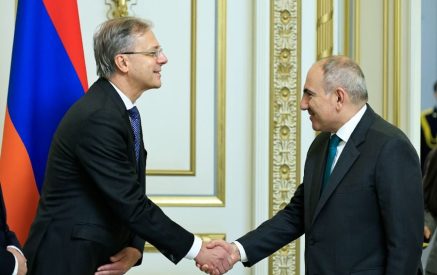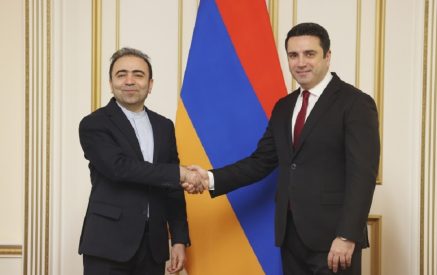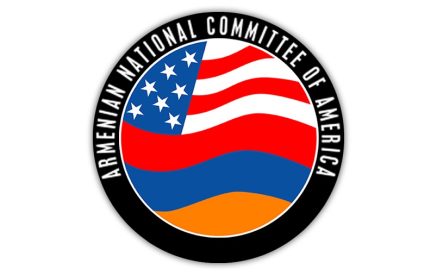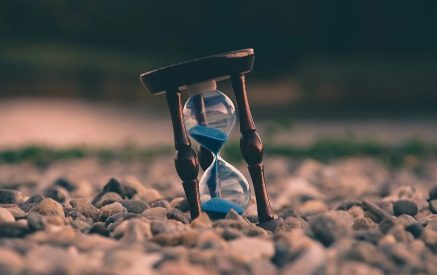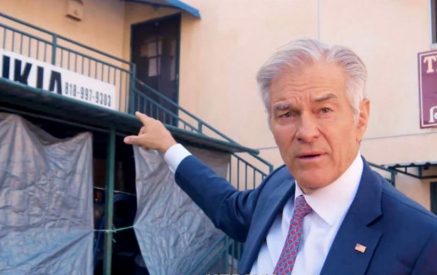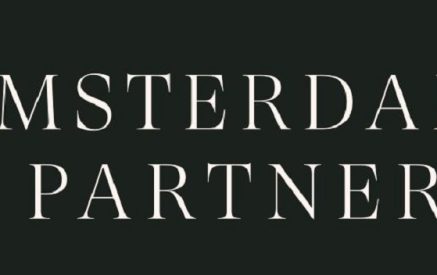The Armenian Weekly. By Michael Mensoian on December 19, 2017. We are only months away from the a presidential election (slated for March 2018) and the beginning of a new system of governance for Armenia. How well it will respond to the many socioeconomic problems that have been created and allowed to fester under the executive presidential system in place since Armenia’s 1991 independence remains to be seen.
“Remains to be seen” is a rather scary possibility to contemplate. The reformation of the Armenian socioeconomic system is not something that should be done, but something that is absolutely necessary to do. Armenia and Artsakh were born from basically the same political event—the break-up of the Soviet Union—and, as a result, their respective prospects are conjoined. Armenia’s future political and economic viability is predicated on Artsakh’s success in achieving independence. As for Artsakh, it success in achieving independence is directly dependent on a revamped and expansive program that addresses Armenia’s socioeconomic shortcomings. This is as interdependent as any two political entities can ever be. A perennially weak Armenia not only endangers the welfare of its citizens, but the citizens of Artsakh as well.
Unfortunately, there are some obvious obstacles that may impede any comprehensive socioeconomic reforms that may be expected under the recently adopted parliamentary system. How serious these obstacles may be is yet to be determined. Some will contend that such negativity is unwarranted—that at this pre-election date, how can we prejudge what may or may not happen? Well this may be true, there are sufficient, shall we say, indicators to cause legitimate concern. The socioeconomic reforms that are needed are too critical and too immediate to the conjoined futures of Armenia and Artsakh to be based solely on faith.
For far too long, our country has been stuck at producing an anemic Gross Domestic Product (GDP) of around 10 billion dollars annually. Much of this GDP is generated by questionable construction that lines the pockets of the oligarchs. As a result, our population continues to decline; poverty and unemployment are unnecessarily high; and families continue to suffer emotionally and psychologically when the breadwinner is forced to seek employment in foreign countries. A nation dependent on remittances from beyond its borders is not in an economically secure position. As we face the post-parliamentary election period, we cannot afford to settle for cosmetic reforms that may force us to reboot some three to four years later because the efforts of good men were thwarted.
Three facts are sufficient to warrant this concern. Although the parliamentary system will restructure the legislative body in terms of numbers and representation and shift the executive power from a president to a prime minister, it will have little or no effect on the political culture of Armenia. It is a culture characterized by nepotism, fraudulence, collusive relationships, and whatever other insidious activity that feeds the voracious appetite for power and wealth of those in control.
Although there will be new ministerial appointments, and hopefully, significant changes in members of parliament, the main cast of political and economic players (some of whom wear both hats) will be the same. Some important changes have already occurred, but it is unlikely that this self-serving alliance, whose influence is deep-rooted and permeates the nation’s political and economic life, will voluntarily abdicate its position of power. This is an issue that must be confronted head-on and won.
Secondly, it is safe to assume that the Republican Party of Armenia (RPA) will remain in control either alone or in a coalition with a minority political party. Unless the make-up of RPA undergoes a fundamental change, significant reform cannot be assured. As long as the oligarchs retain their economic and political power and the collusive relationship between politician and monopolists persists, how can we expect change if introduced to be properly implemented? As long as the marketplace fails to provide entrepreneurial opportunity for both domestic and foreign investors alike, the volume of investment cannot reach some acceptable baseline level that would spur economic growth and job creation.
Lack of opportunity in the marketplace has been the principal reason for the economic malaise that our people have had to endure. Armenians are intelligent, creative, and have a built-in determination to succeed. The closed border with Turkey and the difficulties with Azerbaijan pale in significance to the deleterious effect that the self-serving politicians and oligarchs have had on our country.
Finally, it makes little difference with respect to the direction or the scope of socioeconomic reform whether President Serge Sarkisian is the prime minister, chair of the RPA, or the power behind the throne. Whichever position he assumes, Mr. Sarkisian will remain the alpha politician in Armenia unless a cataclysmic turn of events results in a palace coup by members of his party. Even that, although highly unlikely, would not necessarily guarantee significant change. What role Vladimir Putin would play in this political drama can only be guessed at this time.
This is an objective assessment of what the good people who seek to effect necessary reform may have to confront. This challenge will be better defined once the prime minister is named and cabinet ministers are appointed. It should not take too long, say to the end of 2018, before the new administration provides clues as to its ability and intent.
What should we be looking for as to intent? Examples abound, but here are a few. Will the current program to improve agricultural productivity and infrastructure yield measurable quality of life benefits for the rural folk, or will the benefits be siphoned off by intervening interests? Will the small entrepreneur have meaningful opportunity to participate in the continued expansion of the tourist industry? Will legislation be introduced to open the marketplace to the small citizen investors as well as foreign investors? Leveling the playing field in the marketplace is an absolute must.
Any program that seeks to reform the socioeconomic system must include policies and programs that address the distribution of national wealth. This includes the availability of adequate housing; improved pensions for the retired and the elderly; education; health care; relevant education and work opportunities for challenged individuals; and protection of the environment as a resource that all citizens have a right to enjoy.
The greatest challenge that socioeconomic reformers must confront and overcome is the influence of the cabal of politicians and oligarchs who continue to work against the interests of the Armenian citizen. This is the most difficult and the most dangerous issue that must be confronted. By controlling the marketplace, they have amassed untold wealth and power. This is the same group that will stand in the way of meaningful socioeconomic reform. To believe that a change in the system of governance will, ipso facto, lessen their grip on the country or their insatiable appetite for money and power is more than naive. Without legislative action to rein-in this unholy alliance, the fraudulent and collusive activities that have bled the country dry since independence will continue unabated.
Reform is critical to stopping the continued out-migration of our families and young people and eliminate the need for workers to seek opportunity in other countries. At independence (1991), the population of Armenia was about 3.3 million. Give the rate of increase since then, the present population (2017) should be about four million, more or less. It is now about three million—probably less. We have hemorrhaged at least one million people.
Presently there are slightly over 200,000 more females than males, which supports the established fact that men are more likely to migrate from Armenia than women. Adding to this imbalance is the problem of sex-selective abortions—after China and Azerbaijan, Armenia has the third highest rate of female fetus abortions in the world. Patriarchal norms in Armenia have unfortunately led society to value boys over girls.
This is not a healthy male to female ratio in a population as small as Armenia’s. Reform must not only address this imbalance, but encourage a healthy in-migration as well. A critical measure of Armenia’s socioeconomic reforms will be their effectiveness in increasing family formation, the birth rate, and the quality of life of its citizens.
We hope for the very best to happen. Our people have suffered unnecessarily for far too long. We have an opportunity to set our house in order. Not only is the future of Armenia at stake, but the future of Artsakh as well. I hope that we will have leaders with the courage and the stamina to meet head-on the difficult and dangerous challenges facing our beloved nation.
Photo – The Armenian Weekly




























